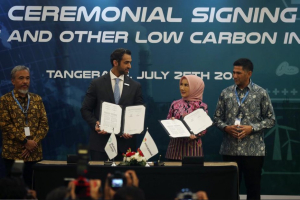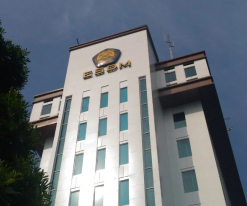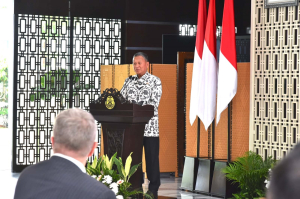Repsol and ExxonMobil eye business opportunities in carbon capture and storage in Indonesia's oil fields
International oil companies, Repsol and ExxonMobil Indonesia, are exploring business opportunities in the field of carbon capture and storage (CCS) services within Indonesia's oil and gas sector. This move aligns with the discovery of favorable carbon storage capacities.
CCS/CCUS is a carbon storage method used to reduce CO2 emissions and prevent CO2 from touching the atmosphere for climate change and being stored underground. Its use can also increase oil recovery in depleted oil and gas fields, and CO2 can be recycled. repeated to produce products of economic value.
Currently, Indonesia has many industrial sources of CO2 such as coal-fired power plants, natural gas processing, oil refineries and various chemical factories. Other studies are currently underway, considering that there are still many large geological storage resources that have potential as CCS/CCUS locations in Java, Sumatra and Kalimantan.
Enhanced oil recovery (EOR) is a method of increasing petroleum production by injecting external energy sources. Meanwhile, enhanced gas recovery (EGR) is the practice of injecting CO2 gas into the field to increase oil and gas production in fields whose reservoirs are starting to run low.
The potential economic benefits of CCS/CCUS are very diverse, ranging from creating jobs, reducing operational costs for providing electricity, extending the life of existing infrastructure, to providing knowledge that can support innovation-based economic growth.
Indonesia support CCS/CCUS through regulations
The Ministry of Energy and Mineral Resources (ESDM) has released regulations for CCUS through Ministerial Regulation (Permen) ESDM No. 2 of 2023 on Carbon Capture and Storage, as well as Carbon Capture, Utilization, and Storage in Upstream Oil and Gas Business Activities. These regulations cover technical, business, legal, and economic aspects.
Regulations regarding the application of CCS in the oil and gas fields will be reinforced through the approval of a Presidential Regulation (Perpres), which is currently in the drafting process. The Perpres will also govern the application of carbon capture utilization and storage (CCUS) technology in the oil and gas fields, allowing the government to monetize oil reservoirs or basins as CO2 emission storage locations. This supports international carbon trading demands.
"Indonesia has Ministerial Regulations, and it is rumored that there will be a Presidential Regulation. CCS projects will also provide jobs during construction and operation. Indonesia is in the right position," said Greg.
The Indonesian government, through the Ministry of Energy and Mineral Resources, is increasingly committed to obligating the upstream oil and gas industry to implement emission reduction strategies, including the use of clean energy technologies such as CCUS and CCS.
This commitment is demonstrated through the setting of operational targets for several CCS/CCUS projects by 2030, with a projected investment of approximately US$7.97 billion, equivalent to around IDR 122.6 trillion.
Minister of Energy and Mineral Resources Arifin Tasrif stated that this investment amount is intended for 15 CCS/CCUS projects carried out by Contractors of the Cooperation Contract (KKKS) and PT Pertamina.
Repsol and ExxonMobil develop CCS projects locally
Greg Holman, Business Director of Repsol Indonesia, stated that they are actively developing a CCS project in the Sakakemang Block in Bayuasin, South Sumatra.
Meanwhile, Egon van der Hoeven, Business Director of ExxonMobil Indonesia, mentioned that they are currently finalizing their strategy for the development of a CCS project in Indonesia.
SKK Migas also noted that Repsol has submitted a proposal for the development of the Sakakemang CCS project to the supervisory authority in the upstream oil and gas sector.
"Indonesia has abundant geological storage opportunities. We see potential and possibilities that lead to attractive business prospects," said Greg on September 21, 2023.
The Sakakemang CCS project is targeted to be operational by 2028, with a potential carbon storage capacity of 6 million tons of CO2 until 2040. During the discussion, Greg commended the Indonesian Government for taking the initiative to create regulations for the implementation of CCS.
ExxonMobil, on the other hand, is collaborating with PT Pertamina to exploit the Sunda Asri CCS/CCUS Hub project. They have identified the potential for carbon storage in the Sunda-Asri Basin amounting to 2 gigatons of CO2.
"Indonesia is truly blessed with its reservoir capacity. Indonesia is fully committed to carrying out these initiatives," stated Egon.
Tag
Already have an account? Sign In
-
Start reading
Freemium
-
Monthly Subscription
30% OFF$26.03
$37.19/MonthCancel anytime
This offer is open to all new subscribers!
Subscribe now -
Yearly Subscription
33% OFF$228.13
$340.5/YearCancel anytime
This offer is open to all new subscribers!
Subscribe now






